This April, while snow blanketed the foothills and rain fell in lower elevations, a drought emergency was declared across (nearly) the entire state.
The Washington State Department of Ecology said the declaration was necessary because of “our state’s low snowpack and forecasts for a dry and warm spring and summer.”
Declaring a drought statewide did nothing to lower temperatures or increase rain, but it did release a flood of $4.5 million in “drought response grants.” The grants required a 50% match, and Clallam County received $15,888. The Jamestown Tribe contributed an additional $10,000. The Tribe used an EPA grant to contribute funds for the drought response grant.
The Tribe’s contribution came with several stipulations outlined in a four-page Memorandum of Agreement. Requirements included:
Education and outreach will specifically target the Sequim-Dungeness River Water Users Association (WUA) and its members or shareholders.
Conduct in-person workshops and outreach events with the WUA members and
shareholders.
Submit to the Tribe a summary upon project conclusion that describes work conducted, deliverables produced, and any problems encountered.
At least one PDN newspaper press release or article and at least one KONP press release or interview about the current drought…
When you fund the message, you can control the message. The Tribe required “in-person workshops and outreach events,” and one is happening this coming week.
Water Conservation Forum this week
Drought education is happening this Tuesday, and retired hydrologist Ann Soule is a featured presenter. At a recent open house about the future Dungeness Reservoir, Soule spoke to the audience during public comment. “If we aren’t storing water at every possible opportunity — in my experience, in my career here over 30 years — we’re gonna be sorry.”
Soule explained that the reservoir would benefit fish, farms, the community, and the economy. That message is consistent with her appearance in a reservoir promotional video filmed seven years ago. The reservoir features several other reservoir supporters, including Jamestown CEO Ron Allen, County Commissioner Mark Ozias, the Washington Water Trust, and local dairy farmer Ben Smith, who sits on the boards of the Dungeness Water Users Association and Clallam Conservation District.
“This [reservoir] proposal is grassroots popular without question. Every single person that we tell about it has the same reaction — ‘We need it immediately, if not sooner.’” — Ann Soule in a reservoir promotional video
Ann Soule also serves on the Clallam County Marine Resources Committee, a nongovernmental organization funded by the Puget Sound Partnership (PSP), which co-authored the “Puget Sound Salmon Recovery Plan.” That report determined that the Dungeness Reservoir was necessary. PSP also sponsored the recent closed-door “Energy and Climate Resilience” summit at the Jamestown Tribe’s 7 Cedars Casino. The publicly funded private conference aimed to influence the County’s comprehensive plan changes.
Clea Rome, director of WSU Clallam Extension, will also speak on Tuesday. Rome participated in a 2021 workshop that justified the eviction of property owners from their beachfront homes by showing how devastating sea level rise could be. A "buy back" program would offset property owner costs, but attendees admitted, "We need to make sure we're using taxpayer dollars wisely and not paying full price for parcels."
The workshop was hosted by the Strait Ecosystem Recovery Network (SERN), a nongovernmental organization whose fiscal agent is the Jamestown Tribe.
Meggan Uecker will also speak. She is the City of Sequim’s Public Works resource analyst and, with Soule, serves on the Marine Resources Committee.
Testing the waters
“It was a good thing drought planning meetings for the Dungeness began back in February,” wrote Jenna Ziogas, Environmental Program Specialist for the Jamestown Tribe, in their December newsletter. Ziogas explained that a “Dry-Year Leasing” program paid farmers not to irrigate. Last year’s program saw over a quarter million dollars paid to area irrigators who didn’t use water between August 15th and September 15th. This year’s program was extended to 45 days.
The Department of Ecology partially funds the Dry-Year Leasing program, which means taxpayer money is paid to farmers who stop producing crops.
According to an ECOS article, the Dry-Year Leasing program is a partnership between the Washington State Department of Ecology, the Washington Water Trust, and the Bonneville Environmental Foundation (BEF). This nongovernmental organization, the BEF, nearly halted the completion of Towne Road again when it sent a letter to Clallam County supporting the Tribe’s stance that it should become a park.
The Washington Water Trust manages the Dry-Year Leasing Program. In an email regarding the 2023 program, Jason Hatch, the program’s director, explained:
“We have run this program in 2015, 2016, 2019 and as you know this year 2023. We work closely in cooperation with the Dungeness Water Users Association- DWUA- the umbrella group for the 7 irrigation districts and companies to identify who among there members, would meet the minimal criteria (at least 5 acres of row crop, pasture or turf, that was irrigated last year by surface waters).
This year, with the drought declared on July 24th, and forbearance needed by August 15-September 15, and funding not becoming available until less than 10 days before August 15, we worked to quickly engage and contract previous participants and others Id’d by DWUA.
In other water short years, we will likely run another program-pending funding availability.”
The article in the Tribe’s newsletter explains another program called “pulse flow.” On August 9th, irrigators were notified that “We will close our headgate and stop all diversions from the Dungeness river for 13 hours from 10am to 11pm on each Saturday a Pulse Flow is needed. You should expect to have low or no water from early Sunday morning until Tuesday depending on how far down the ditch you are.”
The hope was that pulse events would trigger fish to move upstream for 13 hours on Saturdays.
Also, in the newsletter, the Tribe installed inflatable “aqua-dams” and constructed rock dams to direct the fish toward deeper areas. After millions were spent reengineering the Dungeness River to be wider, with the main channel diverted into multiple, shallower “braided” channels, human intervention must now ensure that water is deep enough for fish passage.
Rare opportunity for engagement
Tuesday’s presentation by the Tribe will feature a Q&A — a rare opportunity for residents to engage directly with the policymakers influencing their lives. While this aligns with the Tribe’s statement that it “advocates for community engagement and stakeholders to have meaningful participation,” recent inquiries about the future of our area’s water have been answered with, “Current work is our highest priority and we’ll be unable to respond further.”
Residents could ask about the Dungeness Water Rule, which mandates the metering of private wells and costs thousands in mitigation fees (another blow to housing affordability). The Water Rule, supported by the Tribe, determined that every drop of water drawn from wells in eastern Clallam County depletes the Dungeness River, thus infringing on the Tribe’s treaty-protected salmon harvesting rights. The Department of Ecology has an online presentation linking drought to the need for metering wells. Still, it does not explain why the Tribe’s golf course is exempt from this water conservation measure.
Locals could ask for clarification about the 2021 SERN workshop, which expressed interest in metering the water usage of grandfathered wells (drilled before 2013). The Jamestown Tribe, presenting at Tuesday’s forum, is SERN's fiscal agent and may have additional insight.
Meggan Uecker could field questions from Sequim residents with private wells dependent on the shallow aquifer. At a recent meeting, Sequim’s Director of Public Works explained that upper aquifers leak to lower aquifers; the City draws from the lower aquifers; irrigation ditches charge the upper aquifers; and the Clallam Conservation District has said that the ditch piping project may dry up wells that depend on the upper aquifers. What does the City recommend to hundreds of homeowners with wells that may go dry?
Despite Ann Soule’s assertion that “every single person” supports the reservoir, as a former Dungeness Off-Channel Reservoir Workgroup member, she could address concerns from those living in the shadow of the earthen dam, built on a fault line — during a seismic event, what will prevent 1,600 acre-feet from flooding downriver neighborhoods?
Or one could simply ask, “Who truly benefits when water is scarce?”
Last week, 97% of 146 readers said more levees shouldn’t be removed from the Lower Dungeness River, and 3% supported more levees being removed.




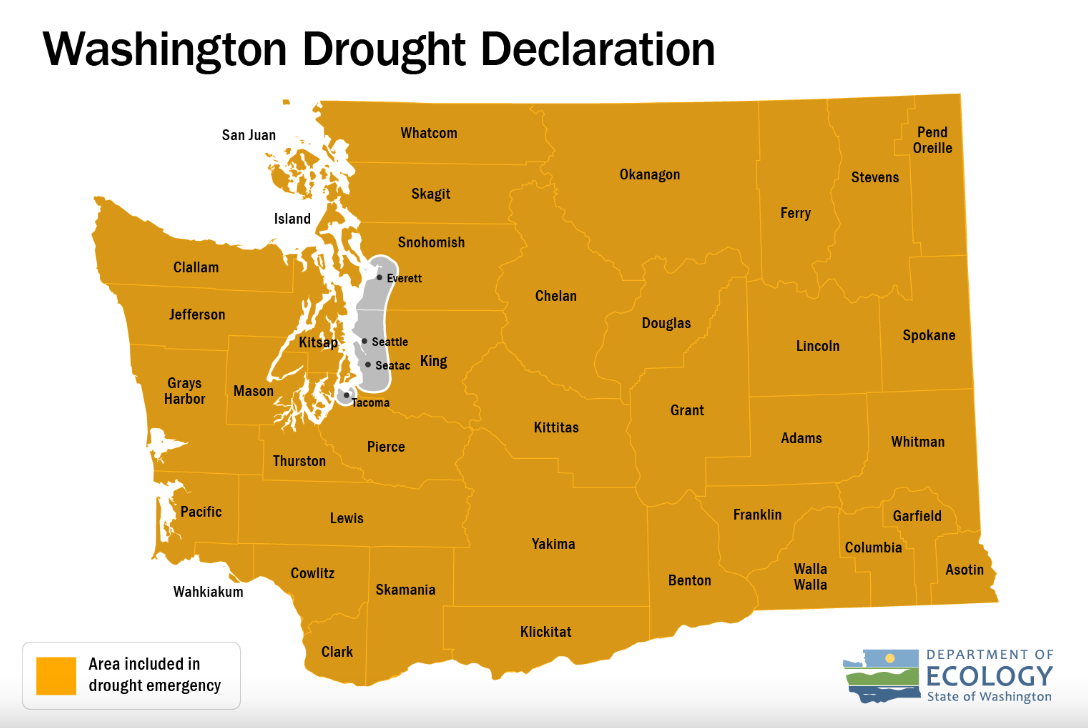

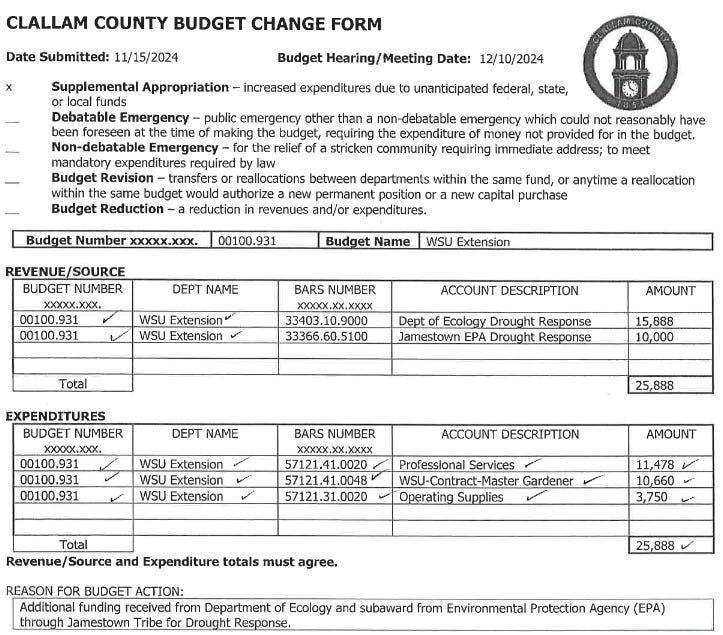
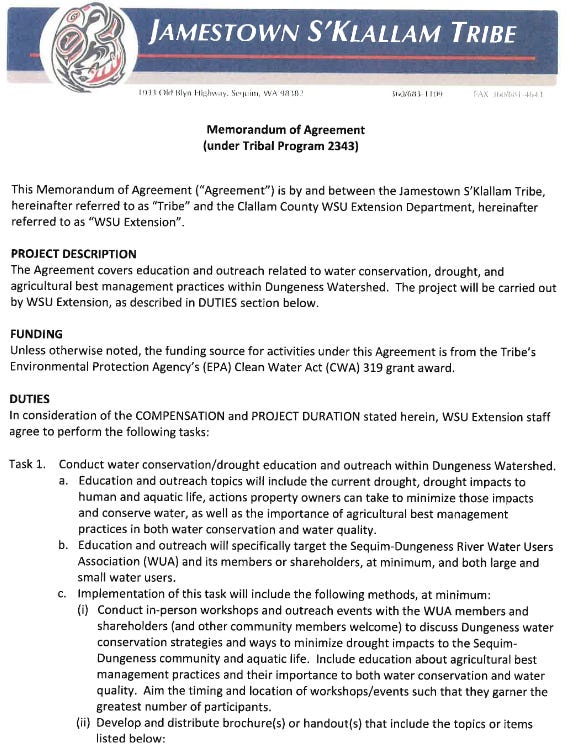
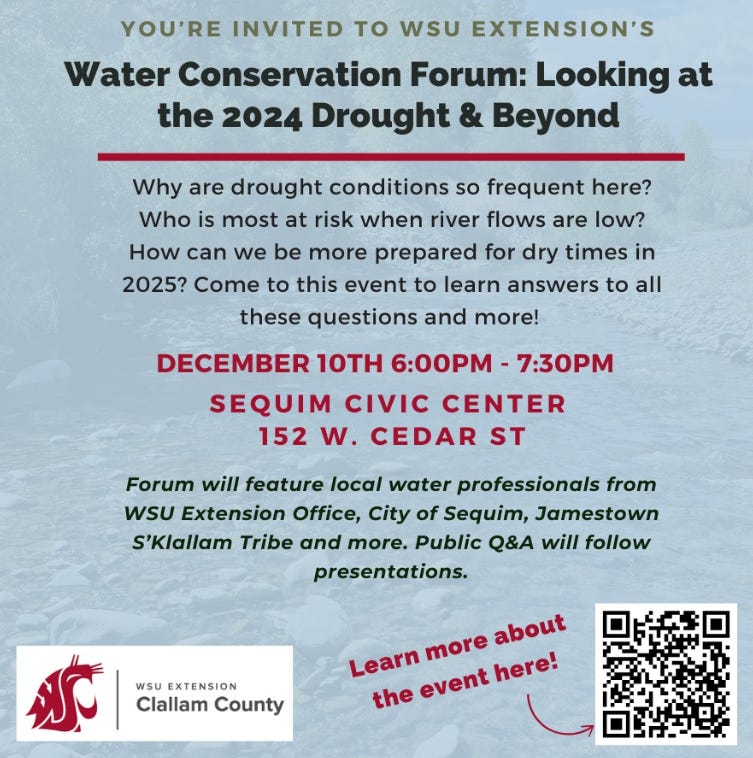
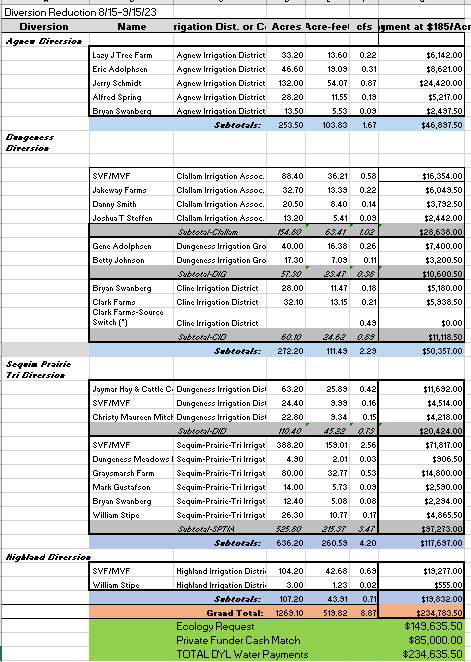
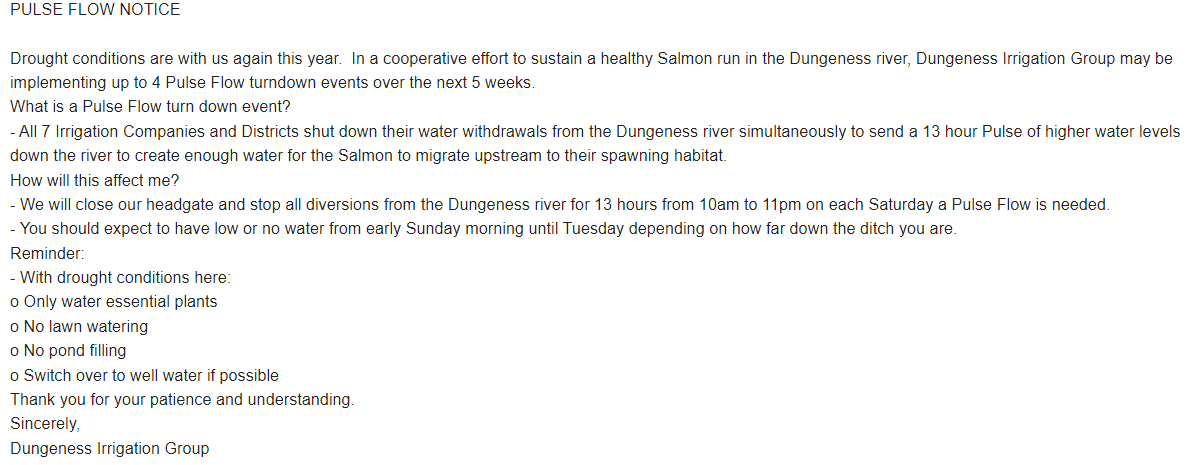
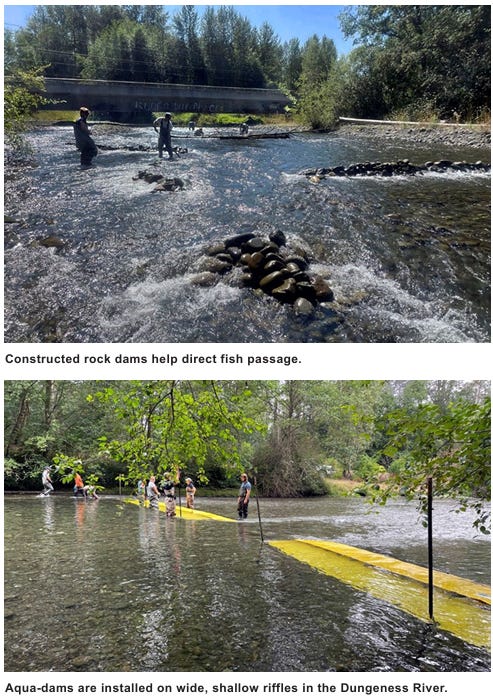
So again the question is what about that new development by John Wayne Marina?? If we are in a drought and people may lose their wells or their wells may dry up because of the usage from the city….then by god we don’t have extra water for that development!! This entire county is so messed Up it’s crazy!!
There has never been a more professional level of Gaslighting in the world than the Professional Gaslighting gushing from the Jamestown S’Klallam Tribe.